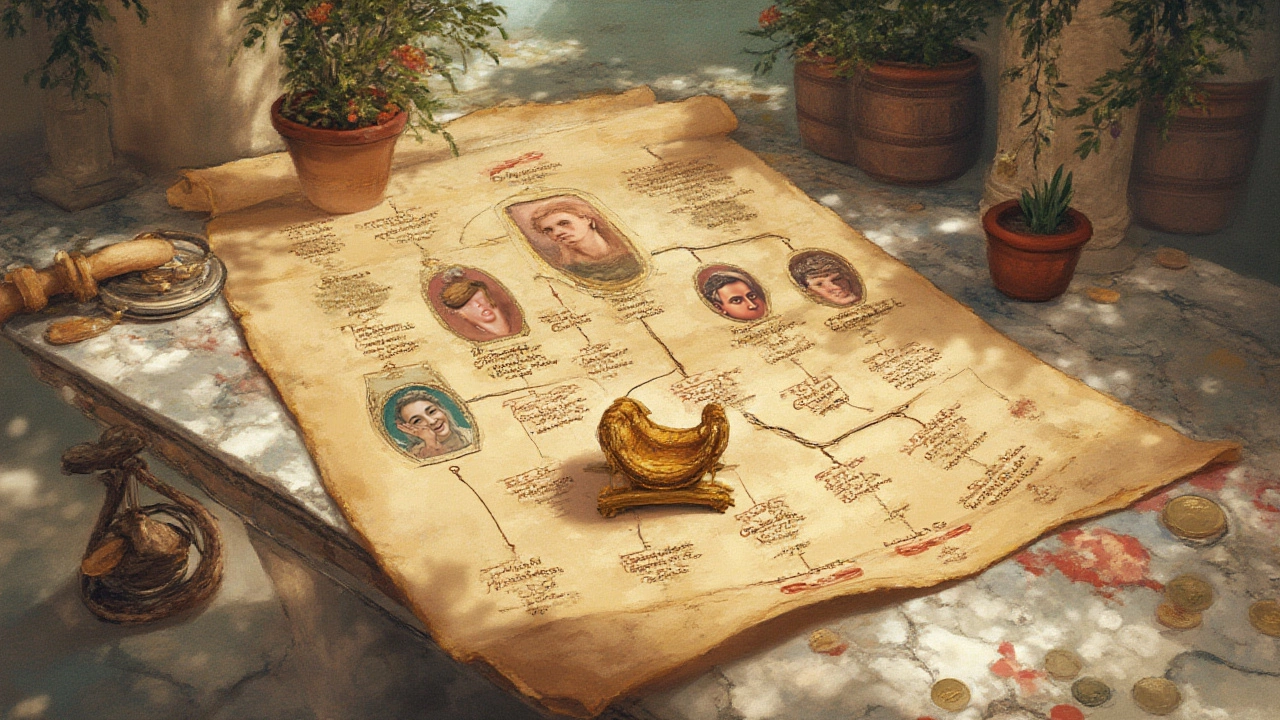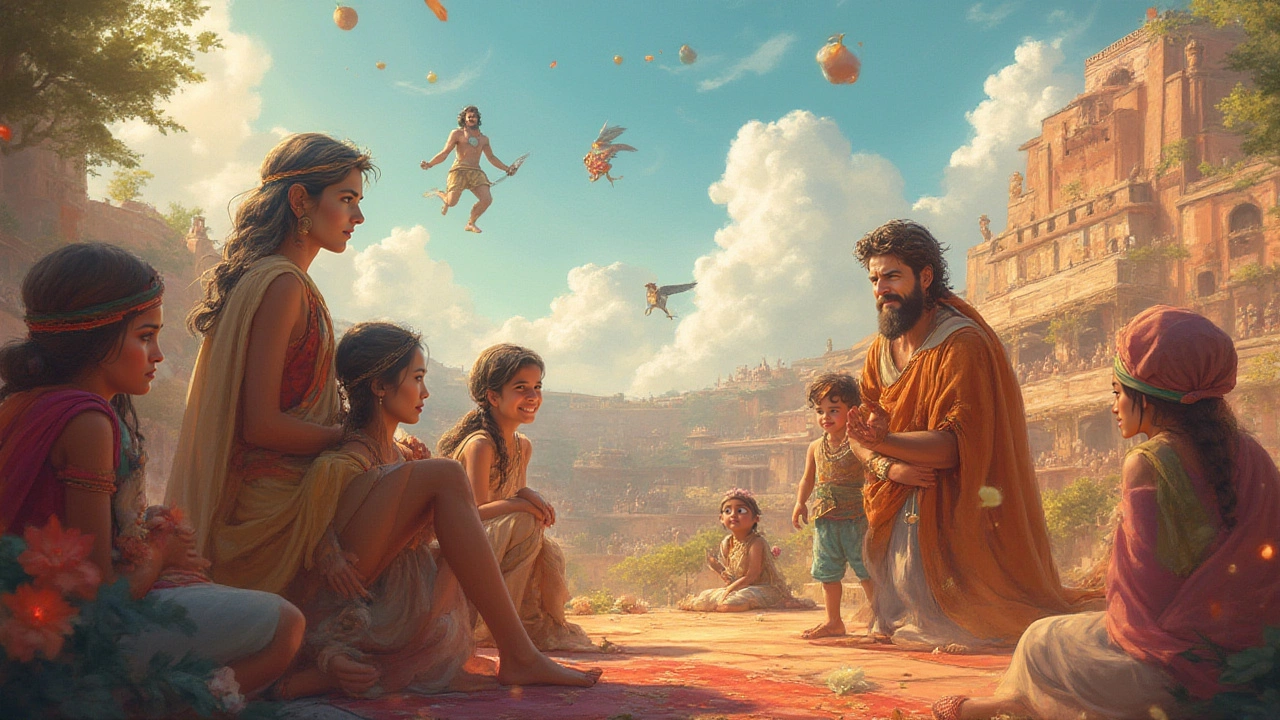Let’s get honest—Greek mythology is a wild, convoluted soap opera, full of steamy affairs and surprise offspring. Most people know that Zeus, famous for his thunderbolts (and even more so for his escapades), had lovers all over the place. Aphrodite, on the other hand, is the goddess of love and beauty; her own love life in the myths is even steamier. Plenty of students, curious readers, and even ancient Greeks themselves have wondered: did these two iconic deities ever hook up? And did they ever have a child together? This question seems simple, but the history and the sources make it a much deeper dive than you might expect.
Zeus and Aphrodite: Setting the Record Straight
Here’s the deal you won’t get from quick pop culture references: in the main body of ancient Greek myths, there’s no canon child that came from Zeus and Aphrodite together. Sure, Zeus had kids left and right—more than twenty by the big counts—while Aphrodite is associated with some famous love affairs, but, surprisingly, not with Zeus. Instead, their roles in the Olympian family tree are a little more tangled.
In most versions of the myth, Aphrodite is actually the daughter of Zeus and Dione. This isn’t always emphasized, thanks to the more dramatic version (depicted in Hesiod’s Theogony) where Aphrodite is born from sea foam after Cronus cuts off Uranus’s, um, private parts. But Homer’s "Iliad" clearly says Aphrodite is the daughter of Zeus. That means, in many retellings, Zeus and Aphrodite are actually father and daughter—not lovers. If reading Greek myth feels like falling into a maze, you’re not alone. Artists and writers kept rewriting these stories, mixing up relationships to fit whatever point they wanted to make or who was paying them.
But here’s where people often get confused. Zeus did chase (or simply seduced) many of the other goddesses, nymphs, and even mortals—but there’s no actual Greek myth that records him as the lover of Aphrodite. Instead, she’s most often linked with Ares, the god of war, with Hephaestus as her official husband, and with several mortals (Anchises being the most famous, father of Aeneas, a big name in Roman legends). It’s a case where imagination and rumor outpaced the old texts.
Just to be thorough, there are a few offshoot plays and poems from later antiquity that toss out fun or even controversial family ties—mythology has always been a living, shifting thing. But you’d have to dig deep into obscure fragments for even a hint that Zeus and Aphrodite had a fling. Anyone who says otherwise is likely blending myths or has read one of the lesser-known sources that were never part of the mainstream tradition.
The Offspring of Zeus: A Quick Rundown
Let’s not gloss over Zeus’s legendary status as a father. The list of his children could almost fill a year’s worth of drama—not one of them with Aphrodite. Here’s a quick table with some of Zeus’s most famous offspring, their mothers, and their main claims to fame:
| Child | Mother | Known For |
|---|---|---|
| Athena | Metis | Goddess of wisdom, strategic war |
| Apollo | Leto | God of the sun, music, prophecy |
| Artemis | Leto | Goddess of the hunt, wild animals |
| Dionysus | Semele | God of wine, festivity, theater |
| Perseus | Danaë | Slayer of Medusa |
| Heracles (Hercules) | Alcmene | Hero, strength, famous labors |
| Helen (of Troy) | Leda | Most beautiful woman, started Trojan War |
None of these came from Aphrodite. Sometimes people assume every female deity ended up in Zeus’s romantic crosshairs, but Greek myths had their own logic (weird as it is). Aphrodite had her own set of famous kids but with different lovers—again, never Zeus.
If you take entertainment or memes at face value, you might start thinking Greek gods all slept with each other and produced hundreds of demigods. It’s more chaotic than that, but also way more specific. There were taboos, jealousies, rivalries—the soap opera vibe comes from the stories, not just the rumors.

Aphrodite’s Lovers and Children: Who Makes the List?
While Zeus is busy fathering half the divine and heroic population, Aphrodite carved out her own legend as a mother—but never as the mother of Zeus’s children. With Ares, the story is spicy: she’s often caught in an affair with him, even though she’s married to Hephaestus. Their children include Eros (the love god better known as Cupid in Roman myth), as well as Harmonia (goddess of harmony) and the twins Phobos and Deimos (the personifications of panic and terror, who bizarrely rode with Ares into battle).
With the mortal Anchises, Aphrodite produced Aeneas, the hero who, by Roman tradition, fled Troy and would lead to the founding of Rome. There’s also Priapus, a fertility god with a rather “memorable” attribute, whose parentage sometimes involves Dionysus or Hermes instead—because, sometimes, mythmakers couldn’t decide who hooked up with whom.
Sometimes ancient myth mixes up details, so you’ll find alternative parents here and there. But when it comes to Zeus, he’s never reliably listed as one of Aphrodite’s lovers, even in outlier versions. I once joked with Lara about how the godly family tree in Greek myth probably looks like a ball of tangled Christmas lights—good luck tracing it without all the names blurring together after a while.
Here’s the clincher: in a few obscure stories, other male gods or mortals are named as Aphrodite’s lovers, but Zeus is always outside her romantic circle. Maybe the ancient writers thought a father-daughter partnership was one complication too many, even for the soap opera that is Greek mythology.
Why Do People Think Zeus and Aphrodite Had a Child?
If you’ve wondered why so many people still ask about Zeus and Aphrodite having a child, blame the tangle of ancient sources, later Roman spin-offs, pop culture, and even comic books. A lot of modern artists blur all the romantic lines for dramatic effect, and new retellings bend the rules even more.
It’s not hard to see how the confusion started. In some versions, Aphrodite is introduced simply as a child of Zeus (with Dione or not), so people might expect their relationship to get complicated (because, in Greek myth, nothing’s off the table). Then there’s the relentless meme-ification of mythology; in video games, movies, or books, mythological connections are often creatively rearranged. You’ll see "Zeus and Aphrodite’s child" come up in fan fiction or as a fun “what if” scenario, but that’s pure creative license, not something out of the ancient scrolls.
Additionally, when you consider the naming confusion, with many gods having overlapping powers, stories migrating from Greek to Roman, and new characters popping up in different regions, it gets messy. It’s like ancient storytelling was an early version of the Marvel universe—but without the internet to keep everyone’s facts straight. Don’t get me wrong, it’s fun to imagine alternate history, but the source material pulls the plug pretty quickly—no kid from Zeus and Aphrodite in the OG stories.
This kind of myth mix-up is common. Try searching for other gods or heroes and you’ll hit similar debates—people love reshuffling myth cards. But if you’re after truth, especially for school or pub quizzes, you want the straight answer: parent-child, not lovers, and no mythological child from this pair.

Greek Myths, Family Trees, and How Stories Change
Now, delving into ancient family trees is pretty much a hobby for classicists and amateur historians like me, but anyone can use a straightforward guide to keep things clear. Greek myth isn’t just dead text; it morphed as it passed through generations. Poets like Homer, Hesiod, and later playwrights had a habit of bending details for drama or theme. If you compare early Homeric poems to later Roman renditions (like Virgil’s "Aeneid"), you’ll spot big differences—even the parentage of gods changes, just to suit the new times or political aims.
Check out this tip: when you want a reliable answer about a Greek myth, start with the big texts—Homer’s "Iliad" and "Odyssey," Hesiod’s "Theogony," and later, Apollodorus’s "Library." These works set the foundation for the major gods and their relationships. If a fact isn’t in one of those, you can be sure it’s either a later invention or a local oddity. That’s the case with Zeus and Aphrodite’s supposed child.
Historians and archaeologists still dig up new clues—vase paintings, inscriptions, lost works—that add flavor to the story. But, as things stand, every major list of Greek gods’ children keeps them separate. Even Wikipedia (hardly the most scholarly source, but it does reference ancient texts) points you to the same answer.
Want to get lost in a myth maze yourself? There are endless rabbit holes, like the identity crises of minor deities, how stories spread from Greece to Rome (where names and tales got swapped), or how ancient art and inscriptions give us brand new family ties. You never know when some forgotten local legend might drop a weird new connection, but unless you’re chasing obscure academic footnotes, don’t bet on finding Zeus and Aphrodite’s mythical lovechild.
